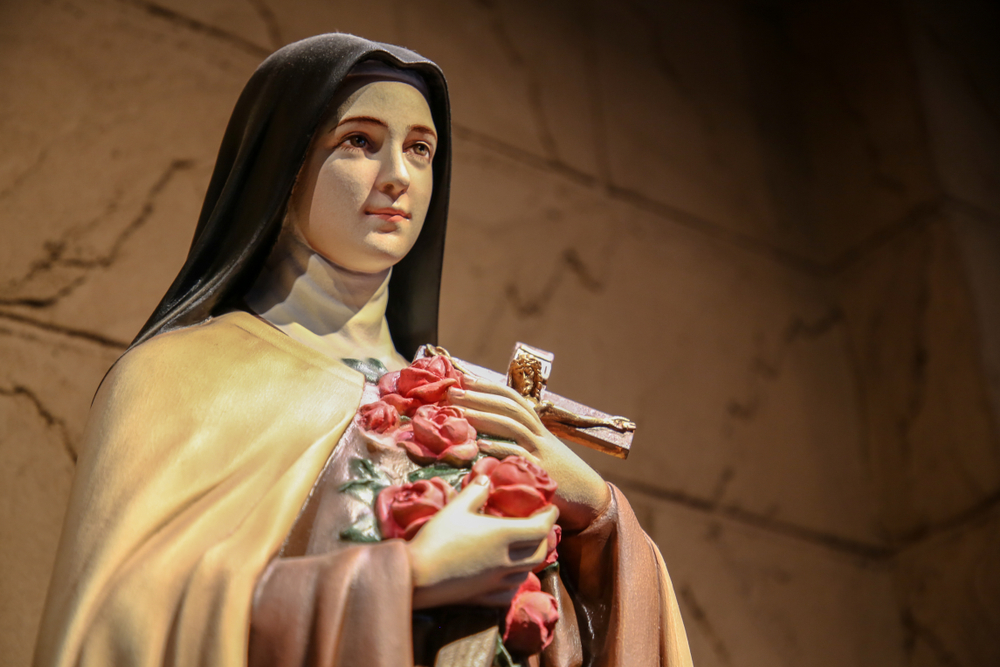Many know her as the “little flower” and for her “little way” spirituality. Since her canonization in 1925 many churches and homes have been adorned with her statue in honor of the many promises and favors that were answered through her prayer and example.
Please find a brief biography of Saint Therese and an awe-inspiring message from her autobiography!
SAINT THERESE OF LISIEUX
At the age of 14, on Christmas Eve in 1886, Therese had a conversion that transformed her life. From then on, her powerful energy and sensitive spirit were turned toward love, instead of keeping herself happy. At 15, she entered the Carmelite convent in Lisieux to give her whole life to God. She took the religious name Sister Therese of the Child Jesus and the Holy Face. Living a hidden, simple life of prayer, she was gifted with great intimacy with God. Through sickness and dark nights of doubt and fear, she remained faithful to God, rooted in His merciful love. After a long struggle with tuberculosis, she died on September 30, 1897, at the age of 24. Her last words were the story of her life: “My God, I love You!”
The world came to know Therese through her autobiography, “Story of a Soul”. She described her life as a “little way of spiritual childhood.” She lived each day with an unshakable confidence in God’s love. “What matters in life,” she wrote, “is not great deeds, but great love.” Therese lived and taught a spirituality of attending to everyone and everything well and with love. She believed that just as a child becomes enamored with what is before her, we should also have a childlike focus and totally attentive love. Therese’s spirituality is of doing the ordinary, with extraordinary love.
She loved flowers and saw herself as the “little flower of Jesus,” who gave glory to God by just being her beautiful little self among all the other flowers in God’s garden. Because of this beautiful analogy, the title “little flower” remained with St. Therese.
Her inspiration and powerful presence from heaven touched many people very quickly. She was canonized by Pope Pius XI on May 17, 1925. Had she lived, she would have been only 52 years old when she was declared a Saint.
“My mission – to make God loved – will begin after my death,” she said. “I will spend my heaven doing good on earth. I will let fall a shower of roses.” Roses have been described and experienced as Saint Therese’s signature. Countless millions have been touched by her intercession and imitate her “little way.” She has been acclaimed “the greatest saint of modern times.” In 1997, Pope John Paul II declared St. Therese a Doctor of the Church – the only Doctor of his pontificate – in tribute to the powerful way her spirituality has influenced people all over the world.
From the autobiography of St. Thérèse of Lisieux
In the heart of the church I will be love
Since my longing for martyrdom was powerful and unsettling, I turned to the epistles of St Paul in the hope of finally finding an answer. By chance the 12th and 13th chapters of the 1st epistle to the Corinthians caught my attention, and in the first section I read that not everyone can be an apostle, prophet or teacher, that the Church is composed of a variety of members, and that the eye cannot be the hand. Even with such an answer revealed before me, I was not satisfied and did not find peace.
I persevered in the reading and did not let my mind wander until I found this encouraging theme: Set your desires on the greater gifts. And I will show you the way which surpasses all others. For the Apostle insists that the greater gifts are nothing at all without love and that this same love is surely the best path leading directly to God. At length I had found peace of mind.
When I had looked upon the mystical body of the Church, I recognised myself in none of the members which St Paul described, and what is more, I desired to distinguish myself more favourably within the whole body. Love appeared to me to be the hinge for my vocation. Indeed, I knew that the Church had a body composed of various members, but in this body the necessary and more noble member was not lacking; I knew that the Church had a heart and that such a heart appeared to be aflame with love. I knew that one love drove the members of the Church to action, that if this love were extinguished, the apostles would have proclaimed the Gospel no longer, the martyrs would have shed their blood no more. I saw and realised that love sets off the bounds of all vocations, that love is everything, that this same love embraces every time and every place. In one word, that love is everlasting.
Then, nearly ecstatic with the supreme joy in my soul, I proclaimed: O Jesus, my love, at last I have found my calling: my call is love. Certainly, I have found my place in the Church, and you gave me that very place, my God. In the heart of the Church, my mother, I will be love, and thus I will be all things, as my desire finds its direction.


